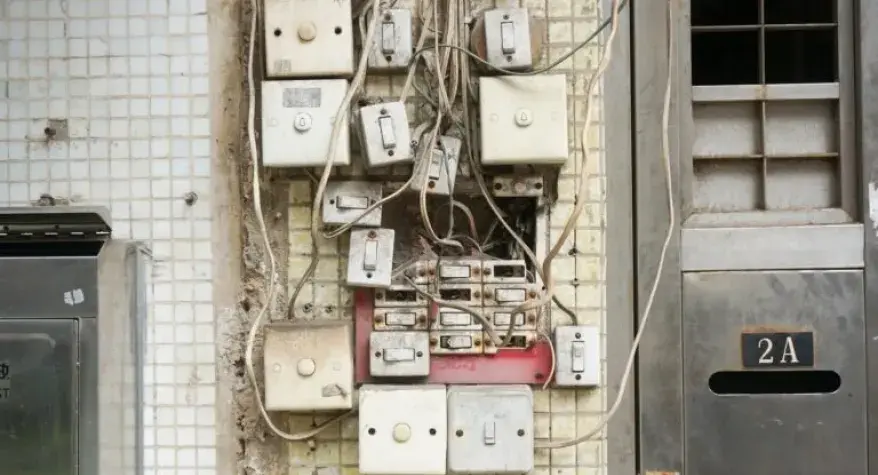5 Signs You May Need a Whole House Rewiring
When you have lived in a house for a while, or have moved into an older house, you might start to notice some signs of wear and tear. Perhaps some chipped paint? Or is worn carpet or some mould building up in the bathroom? These problems are easy to spot.
But what about those things that are less obvious? How would you know if your electrical system needed upgrading?
Faulty electrics can be a serious fire hazard and can lead to serious injury. Modern electrical rewiring adheres to strict regulations, so whether you need a rewire often comes down to the age of the house. If your house hasn’t been rewired in the last 25 years, or if you are undertaking some remodelling work or an extension, then now might be the time to rewire your house.
Why should I rewire my house?
There are several reasons why you should consider rewiring an out-of-date or faulty electrical circuit in your home.
1. Safety
Most importantly, electricity is dangerous and you should always be careful when it comes to the wiring in your house. Just look at some of these statistics:
Around 1,000 accidents are reported to the Health and Safety Executive each year. Faulty electrical equipment and sockets cause approximately 70 deaths and 350,000 injuries in UK homes every year. This shows just how important it is to follow safety guidelines and maintain your electrical system and appliances.
Not only that, but electrical incidents can lead to house fires. On average, over 20,000 homes are affected by accidental fires every year, and shockingly, electricity is the biggest contributor. In 2019/2018 alone, 14,186 domestic fires in England were caused by an electrical fault which accounts for 53.4% of all accidental fires in England.
2. Home value
Also, updated electrical wiring can improve the value of your home as modern functional wiring with sufficient sockets, and other features, is attractive to new buyers. An old fuse board or sockets can put buyers off due to the thought of the cost of a rewire.
When should I look to rewire my home?
If your house hasn’t had its wiring updated recently, then here are five signs that it might be time for a whole house rewire.
1. Flickering Lights
If one of your lights flickers or dims without warning, then there is probably a fault with the bulb. But if you notice regular flickering lights in several rooms, then it could be a sign of electrical problems and you should get it checked out. When a light brightens, there is too much voltage and when they are dim, they are receiving too little. This fluctuation is often a sign that there are loose wires or a faulty connection somewhere.
2. Persistent Burning Smell
Faulty wires can leave a nasty burnt smell in the air. If you smell burning and you can’t identify the source, then it’s possible that you need to rewire your house. You should turn off the power at the circuit and contact a local domestic electrician as soon as possible. They can check the wiring for you.
3. The Fuse Board Trips Regularly
Another sign that your house could need rewiring is if the fuses blow regularly and randomly. Although it’s important to remember that it could simply be a faulty appliance and so you should check out your appliances first. But if it keeps happening and you can’t identify an appliance that could be causing it, then you should get a professional to check your wiring as you may need a new fuse box or a house rewire.
4. Obvious damage
Some signs are easy to see. Any brown marks on your sockets could be a result of electric sparks or tiny fires caused by loose connections inside the sockets which need to be checked by a local domestic electrician. Similarly, if you get regular electric shocks (however small), you should get your wiring looked at by a professional.
5. Older House
If your house is more than 30 years old and you don’t know if it’s been rewired, or if you feel that the switches, sockets and fuse box look old, you should get an electrician to look at your system. Old sockets and wires aren’t necessarily unsafe, but it is best to get them checked.
Older houses also tend to have fewer electrical sockets, leading to overloading sockets and reliance on extension leads, which can be dangerous. The advantage of a house rewire is that you can install additional sockets where you need them.
How much will a house rewire cost?
The cost of a house rewire will vary depending on the size of the house, and whether the whole house needs to be rewired or if a partial rewire will be sufficient.
A whole house rewire of a 3 bed could cost around £6,225 but depending on various factors this will vary. There will also be significant disruption when the work is done, including the need to replaster the walls after the work is complete.
A rewire can take around a week, again depending on the size of the house and how much work is being done.
Not sure if you need a rewire?
If you’re not sure whether you need a rewire, it is best to get an Electrical Installation Condition Report (EICR) carried out on your home first. This can be done by a local electrician.
An EICR explains how well your circuit is working and tells you if any work needs to be done to bring it up to safety standards. It’s recommended that a homeowner gets an EICR completed every 10 years to check your electrical installation. For rented property, an EICR is needed every 5 years and should be paid for by your landlord.
House Rewire
These potentially dangerous warning signs may suggest that you need a whole or partial house rewire. Electricity can be incredibly dangerous and so it is important that you get your system checked, especially if it is an older property. Rewiring your home can help you to avoid the risk of a potential electrical accident.




